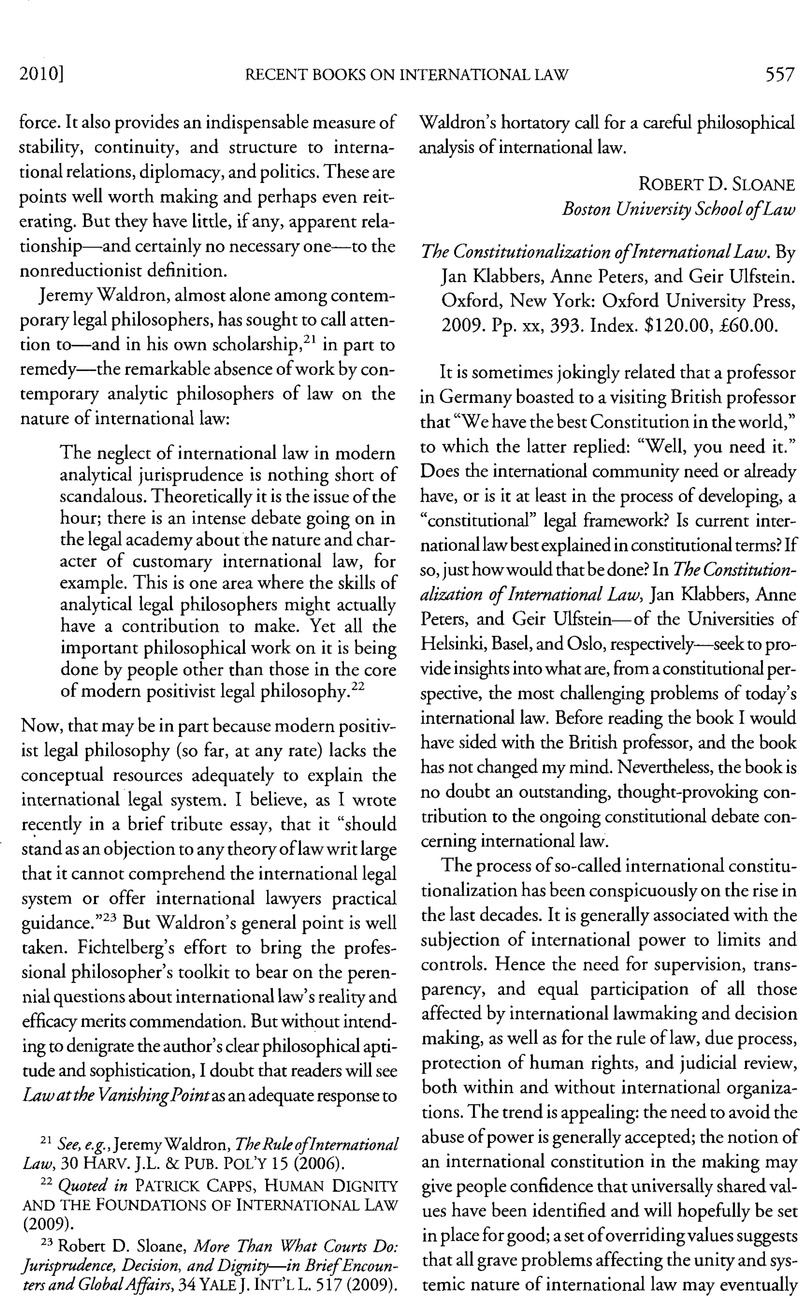No CrossRef data available.
Published online by Cambridge University Press: 27 February 2017

1 See Peters, Anne Compensatory Constitutionalism: The Tunction and Potential of Fundamental International Norms and Structure, 19 Leiden J. Int’l L. 579 (2006)CrossRefGoogle Scholar.
2 Dunlop, Emma Humanity as the A and the Ω of Sovereignty: Four Replies to Anne Peters, 20 Eur. J. Int’l L. 545, 560 (2009)Google Scholar. Peters replied that her approach “is ‘value–neutral’ to the extent that it does not generate norms, but only a theory about norms.” Peters, Anne Humanity as the A and Ω of Sovereignty: A Rejoinder to Emily Kidd White, Catherine E. Sweetser, Emma Dunlop and Amrita Kapur, 20 Eur. J. Int’l L. 569, 579 Google Scholar. The point is that it is precisely her “theory about norms” that appears value oriented: no one would doubt that a scholarly approach may per se “generate norms.”
3 Although they do not attempt to demonstrate that a constitutionalization is actually taking place (it is, as noted, simply their background assumption), it is also the authors’ view that “all the talk about constitutionalization does not exist only in the minds of academiclawyers” (p. 5).
4 A “thin” approach to international constitutionalism was previously sketched by Klabbers in Constitutionalism Lite, 1 Int’L Org. L. Rev. 31 (2004).
5 For an accurate analysis of what is meant by enforcementin general, see Reiff, Mark R. Punishment, Compensation, and the Law: a Theory of Enforceability (2005)CrossRefGoogle Scholar.
6 This section of the book is a summary of Peters’s article Humanity as the A and the Ω of Sovereignty, 20 Eur. J. Int’l L. 513 (2009)Google Scholar.
7 Crouch, Colin Post–Democracy (2004)Google Scholar.
8 Rawls, John Political Liberalism 36 (expanded ed. 2005)Google Scholar.
9 Schmitt, Carl Der Gegensatz von Parlamentarismus und modemer Massendemokratie, in Positionen und Begriffe im Kampf mit Weimar—Genf— Versailles 1923–1939 at 52, 59 (Berlin: Duncker & Humblot, 1988) (1926)Google Scholar; Schmitt, Carl Der Begriff des Politischen 14 (1932)Google Scholar.
10 In her article Compensatory Constitutionalism, supra note 1, at 605, Peters herself argued that “the constitutional reading of current international law is to some extent an academic artefact” that “lays emphasis on certain characteristics of international law.”
11 Kennedy’s cautious approach is in this respect the wisest attitude. Kennedy, David The Mystery of Global Governance, in Ruling the World? Constitutionalism, International Law, and Global Governance 37 (Dunoff, Jeffrey L. & Trackman, Joel P. eds., 2009)Google Scholar.